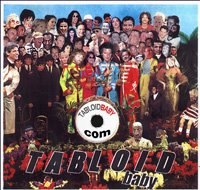
Barry Levinson was quoted about the Writers Strike:
"It used to make more sense when the writers and all the guilds negotiated with studio and TV people; Paley owned CBS, Sarnoff owned NBC, and you had studio heads like Jack Warner and Zanuck. Now you've got writers who are negotiating with giant corporations, and there's a whole other sensibility. NBC is part of General Electric, and General Electric has enough contempt for its entertainment division even without a strike. Writers are like little gnats to them. So this is a whole other game, a bit like a small little guy against these behemoths. Not anything close to what it used to be in the past. GE looks at all its people and all its assets and asks, If we're struck for seven months, what does it mean in terms of the bottom line? It's probably like a minor dent in their portfolio."
It was an aha, "light bulb" moment for a lot of people, but here at Tabloid Baby, the light bulb moment occurred in 1987. And it was the last GE light bulb we'd buy.It was twenty years ago and three weeks ago that we writers and other members of NABET, the National Associaton of Broadcast Engineers and Technicians, ended a long and bitter strike against NBC. NBC had been acquired the year before by General Electric, the multinational conglomerate and fourth-largest corporate producer of air pollution in the United States, best known for its divisions that made lightbulbs, washing machines, refrigerators and nuclear weapons. Key to getting the new era underway was forcing NABET, then known as "the Cadillac of unions" into the car compactor.
 As the New York Times reported at the time: "Carrie Biggs-Adams, president of Local 53, said few workers were pleased with the three-year agreement, and exhaustion played a role in ending a walkout that cost the union $700,000 a month in strike benefits.
As the New York Times reported at the time: "Carrie Biggs-Adams, president of Local 53, said few workers were pleased with the three-year agreement, and exhaustion played a role in ending a walkout that cost the union $700,000 a month in strike benefits. "'After 118 days, people tend to get tired,' she said. ''It's very, very hard to go so long without income.'''
We just remember walking the picket lines in New York, Washington, D.C. and Chicago, mainly in New York, outside 30 Rockefeller Plaza. We tried to convince celebrities not to cross our picket lines to appear on Letterman's show, and phoned in stories to Page Six about the ones who did. Like our fellow WGA members today, we rallied with Jesse Jackson and chanted and and stood behind police barricades for hours on end. And looking up at the RCA Building above us-- soon to be renamed the GE Building-- we realized how small and inconsequential we looked to the suits on the high floors.
 Today they make sketch comedy jokes about it on 30 Rock, but it marked a big change in the industry 20 years ago. And that's what we writers are up against today.
Today they make sketch comedy jokes about it on 30 Rock, but it marked a big change in the industry 20 years ago. And that's what we writers are up against today. (Read about the dawning of the nuclear show business era in the book, Tabloid Baby.)






































2 comments:
I feel for the writers and hope they get some decent compensation. They create the golden goose, but aren't included at all in DVD profits or online viewing.
If studios continue to fight illegal taping and trading, that alone proves the value of those movies.
It's scary to think that the corporations can wait this out much easier than individual writers. Thousands of non-WGA jobs depend on production and our local econmy is going to tank even worse.
Looks like the suits' ruse is to hold tight, bust a union and be on their way. Distribution is cheap and easy. They want content to be the same, whatever it takes.
And this from Nikke Finke:
"Some 3,000 Battlestar Galactica fans, in town for a convention, are pledging to join a picket line with the show's writing staff at Universal Studios on Friday." (DHD)
Post a Comment